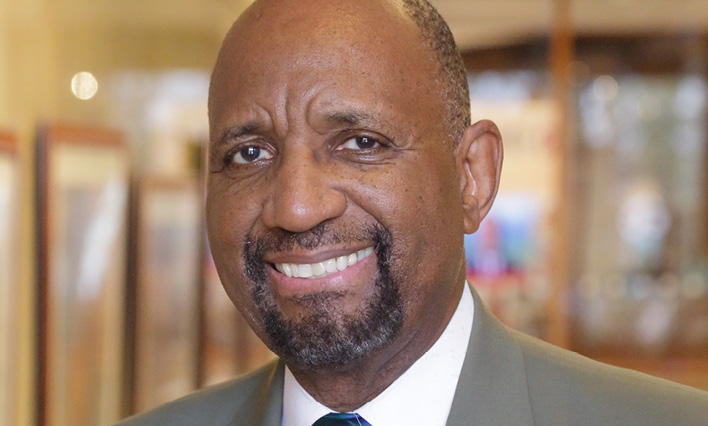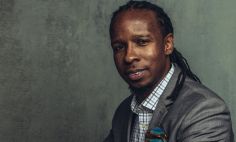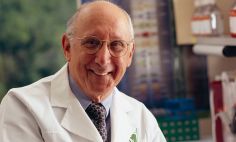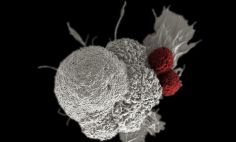When David L. Nash isn’t sharing stories about his time as a Harlem Globetrotter or serving as the Education and Outreach Liaison for the National Library of Medicine (NLM), he gives back to his community through health and wellness. The former basketball player is known not only for his talent on and off the court, but also for his colon cancer diagnosis. He talked with NIH MedlinePlus Magazine about his experience with colon cancer and how he advocates for early screening.
When were you first diagnosed with colon cancer, and how long were you living with cancer?
I think it was around 2009, and I was in the early stages of colon cancer. I went in for a yearly physical and my doctor did a routine colonoscopy, and that’s when he discovered that I had colon cancer. I lived with cancer for about a year without knowing it.
Did you have any signs or symptoms?
I didn’t have any signs or symptoms at the time. My doctor was doing a standard colonoscopy, and that’s when they discovered polyps in my colon. My doctor tested the polyps and said that I did have colon cancer.
What was your treatment approach?
I remember going through the operational procedures [at the Georgetown Lombardi Comprehensive Cancer Center] in Washington, DC, and I remember it so well. My doctor had to be about 5 feet, 2 inches, and I looked like Frankenstein on the table because I’m 7 feet tall. They had to sterilize a chair and bring it in for the procedure because I was too long for the table.
The following treatment approach was to do radiation, and I did radiation at the DeCesaris Cancer Institute in Annapolis, Maryland. I did radiation about twice a week. Fortunately, there was no pain during the radiation, especially since I just had surgery. So, I was doing radiation and taking medication, which was beneficial for me.
What choices do you make to help you stay active and healthy?
I stay away from a lot of red meat. A lot of people enjoy fast food, my grandchildren included. They love fast food and I swear, I spend almost $100 every time I go. But I eat fruits and vegetables and do a little bit of exercising. I do a little bit of walking, keep it lean and green, but I don’t overdo it.
How have your career and experience with colon cancer impacted each other?
I will say, being a basketball player really gets you in the door to talk to people about the importance of health and wellness. People love to hear about basketball, so I often lead with stories of my brief time with the Chicago Bulls or my experience as a Harlem Globetrotter. Eventually, I put that to the side and really discuss the importance of health and wellness.
What is your message to others about early detection and treatment?
Colon cancer is common in the African American community, so I really encourage Black men (as they have a higher chance of developing colon cancer) to get tested because it is curable. You must get screened, you must get tested, because you do not want to wait too long. It becomes difficult to treat if you wait until the last minute. Early detection is key. It is the most curable form of cancer if caught in time, and that is what I want to emphasize.
You discovered that colon cancer runs in your family. How do you connect with your family about health and wellness, and how do you encourage early screening with the men in your family?
I had no idea colon cancer runs in my family. At the time of my diagnosis, my doctor and I talked about the genetics of it. I was very fortunate to be speaking at a conference in Little Rock, Arkansas, and while I was there, a few of us from the conference went into the archives of Little Rock and found the generational history of my family. I found out my great grandfather and uncles on my mother’s side also had colon cancer. That’s when I found out that colon cancer runs in my family.
I emphasize that early detection and treatment is key, and if they find that it’s in your body, you have got to think positively about how you’re going to get it out. My father-in-law died from colon cancer when he was about 84 or 85 years old. If the cancer had been detected early, he may have had treatment opportunities. At that age, there wasn’t much that could be done, but he lived a good life and died peacefully.
How do you advocate for health and wellness in your community?
My pastor, Dr. Henry P. Davis, III, and I bring a group of pastors and people together on Sundays to talk about health and how to begin to address it. We then discuss health and one of the biggest things that we are facing right now is mental health. Mental health is important, especially for our young children. Then we go back and discuss colon cancer, which is one of the most curable cancers if caught early.
In what ways do you connect with the community about colon cancer?
In communities of color, I often find going to churches and other community programs is the best. I take print material from NLM that has information about colon cancer and hand those out. I think they are beneficial, so I take boxes of them out to the community and really talk about it. When I go out and speak about colon cancer, people are often surprised that I am a former cancer patient because colon cancer affects you in a way that you can’t really tell that you have it. When I had cancer, you couldn’t tell—I didn’t lose any weight or anything like that. I was just blessed to have such an amazing medical team at the time.







